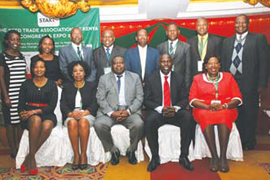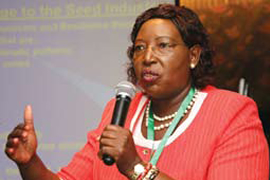Adapt to climatic changes
The long term survival of our food production systems is intimately tied to the seed stewardship.
By Moses Wasamu
Climate change has had serious implications on rain-fed agricultural systems of Sub-Sahara African countries. These changes can be seen in change in rainfall patterns and distribution. Traditionally in Kenya, the short rains were expected in Mid-October but now the onset date has shifted to end of October/starting of November. The distribution is more erratic and unreliable.
These changes have led to reduced food production and increased food insecurity, especially among rural-based communities, reduced incomes of and increased vulnerabilities of farmers, and has led to unpredictable seed production and sales.
Experts now say there is need to utilise coping and resilience mechanisms in order to enhance access to improved seeds that are more adaptable to changing climatic patterns.

Dr. Florence Wambugu, chief executive officer of Africa Harvest Biotech Foundation International and Nehemiah Mburu, the programme manager, said that experts need to develop seed varieties that are tolerant to drought and floods, and those that are heat, pest and disease resistant. Additionally, they say there is also need for seeds that are suited to various agroecological zones, and those that mature early and are water-efficient.
They were speaking during the just concluded Seed Trade Association of Kenya (STAK) Annual Congress and Expo held in Nairobi. They said that seeds play a critical role in the food security of any country and thus the governments in the region should pay more attention to the sector.
They say that seed companies have to ensure timely access of improved seeds that are true to type, have good germination (above 85%), those which are treated and also certified.
Continuous improvement and long term strategies in research and development is critical to success, they say, especially with regard to new crops for new technologies, market opportunities and resilience.

Dr. Wambugu said STAK has a critical role to promote seed companies, address common challenges and support members to adapt to climate change. “The contribution of foreign multi-national seed companies should also be considered in the context of the value-chain and overall food security agenda in the country,” she said.
Government policies, which currently target a few members in the value chain, should consider the impact on all the stakeholders in the value chain and focus on more members. They said the success of seed companies is influenced by the success or failure of other value-chain partners in the crop business.
They say stakeholders should foster valuebased and inclusive producer-public-privatepartnerships (4Ps) to strengthen value-chains in order to improve coping mechanisms. “NGOs, other community based institutions (CBOs) and local governments have an important role in the sustainability of value chain development initiatives,” they say.
To make this a success, they propose that formal, as well as informal seed systems, should be promoted to enhance access, affordability and diversity of local germ-plasm (these are living genetic resources such as seeds or tissue, that are maintained for the purpose of animal and plant breeding, preservation, and other research uses).
The experts say that because of climate change and changing climatic patterns, there should be timely delivery and distribution of seeds, and the development of monitoring systems and information dissemination pathways to farmers e.g. when to plant.
This can work better when there is closer integration with weather forecasting departments (public) or investing in private forecasting platforms, they said.